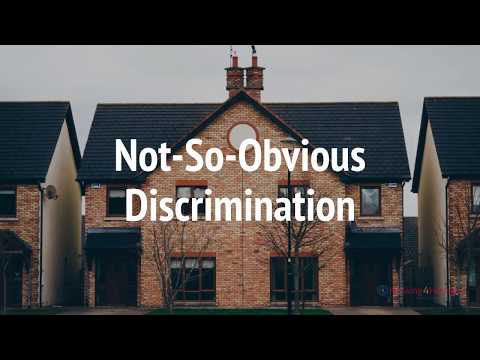
FAIR HOUSING COMPLAINT AND SETTLEMENT
Have You Been Discriminated Against?
Marshall Welton, and Indianapolis businessman and real estate investor, along with eight other defendants (all companies owned by Welton), was recently named a defendant by the Fair Housing Center of Central Indiana as advocate for 12 individual Plaintiffs in a lawsuit filed in June of 2018 in the United States District Court for the Southern District of Indiana. The lawsuit alleged numerous violations of federal consumer protection laws, including the Fair Housing Act, Equal Credit Opportunity Act, Civil Rights Acts of 1866 and 1871, and the Truth in Lending Act. The lawsuit also alleged numerous violations of the Indiana’s consumer protection laws, including the Indiana Residential Real Estate Sales Disclosure Statute; the Indiana Landlord – Tenant Relations Statute, and the Indiana First Lien Mortgage Lending Act, the Indiana Consumer Credit Disclosures Act, the Indiana Consumer Sales Act, and the Indiana Home Loan Practices Act. The lawsuit reached settlement that produced the entry of a mutually agreed upon Consent Decree where no party admitted fault, but that will require the defendants to re-tool their operating procedures to insure strict compliance with the federal and state civil rights and consumer protection laws Defendants were alleged to have violated to begin with.
 According to the Complaint, the Defendants were engaged in the sale and rental of central Indiana real estate to low income consumers who were largely members of the local Hispanic community which exploited their language limitations and need for housing. The Complaint describes how the Defendants engaged in a scheme designed to reap all the advantages of a landlord when it was expedient and advantageous and as a real estate seller, when circumstances were otherwise. Defendants allegedly skirted every relevant civil rights protection they were obligated to adhere to, as well as Indiana consumer protection laws. The Complaint also alleges Defendants mortgaged properties it sold to its unsuspecting clients without their knowledge or consent and without any subordination agreements with the lenders, making it virtually impossible for Defendants to deliver good title to Plaintiffs. Despite these allegations, the Defendants entered into a Consent Decree where they basically agreed to pay damages to the twelve plaintiffs, pay attorney fees to plaintiff’s attorneys, and amend their practices to comply with the various federal and state laws they were alleged to have violated in the first place. However, since the matter settled, there are no findings by the Court, nor precedent to be cited, enforced, or followed. At most, this arrangement serves as a warning that similar real estate investors plying the same tactics might find themselves named in similar lawsuits in the future.
According to the Complaint, the Defendants were engaged in the sale and rental of central Indiana real estate to low income consumers who were largely members of the local Hispanic community which exploited their language limitations and need for housing. The Complaint describes how the Defendants engaged in a scheme designed to reap all the advantages of a landlord when it was expedient and advantageous and as a real estate seller, when circumstances were otherwise. Defendants allegedly skirted every relevant civil rights protection they were obligated to adhere to, as well as Indiana consumer protection laws. The Complaint also alleges Defendants mortgaged properties it sold to its unsuspecting clients without their knowledge or consent and without any subordination agreements with the lenders, making it virtually impossible for Defendants to deliver good title to Plaintiffs. Despite these allegations, the Defendants entered into a Consent Decree where they basically agreed to pay damages to the twelve plaintiffs, pay attorney fees to plaintiff’s attorneys, and amend their practices to comply with the various federal and state laws they were alleged to have violated in the first place. However, since the matter settled, there are no findings by the Court, nor precedent to be cited, enforced, or followed. At most, this arrangement serves as a warning that similar real estate investors plying the same tactics might find themselves named in similar lawsuits in the future.
The impact of this arrangement might be significant to the extent this group of defendants controls a substantial share of the market and their competitors are watching to see the outcome of this lawsuit. Certainly, anyone who would turn a blind eye to this lawsuit and continue to ignore the many federal and state statutes designed to ensure the civil rights of all Americans as well as their consumer rights must proceed at great peril to their financial interests. Undoubtedly, many will do just that, because consumers will rarely recognize how these investors are violating the law and how their rights are being violated. Opportunists will fill in the gaps.
For those would be landlords and/or sellers of real estate, and the professionals who assist them, great care should be given to insure they do not violate any of these statutes while attempting to sell or lease their real estate. Leasing or selling a residential home to anyone individual who intends to live in the home as their primary personal residence, triggers a whole host of obligations that mandate prudent action and carefully worded disclosures in order to avoid running afoul of the Fair Housing Act, the Equal Credit Opportunity Act, the Truth in Lending Act, the Indiana Residential Real Estate Sales Act, the Indiana Landlord – Tenant Relations statute, the Indiana First Lien Mortgage Act, the Consumer Credit Disclosure Act, and the Deceptive Consumer Sales Act. Equal Protection, the Civil Rights Act of 1968, the Americans with Disability Act may also relate to a lease or sale of real estate. When a real estate transaction turns bad, parties on both sides of the deal would be well advised to seek the assistance of an Indiana real estate attorney.
So if you think the statement Have You Been Discriminated Against applies to you, contact us. We can help you. While exemptions exist regarding some of these Acts no individual can be exempt as to all these applicable laws and consequently, investors and real estate professionals should be vigilant in their efforts to play fair and follow the law. The next defendant may not be so fortunate to secure a settlement where no legal findings and judgments are rendered against them. They may end up carrying that judgment like a bad tattoo forever tainting their name in local real estate markets.








